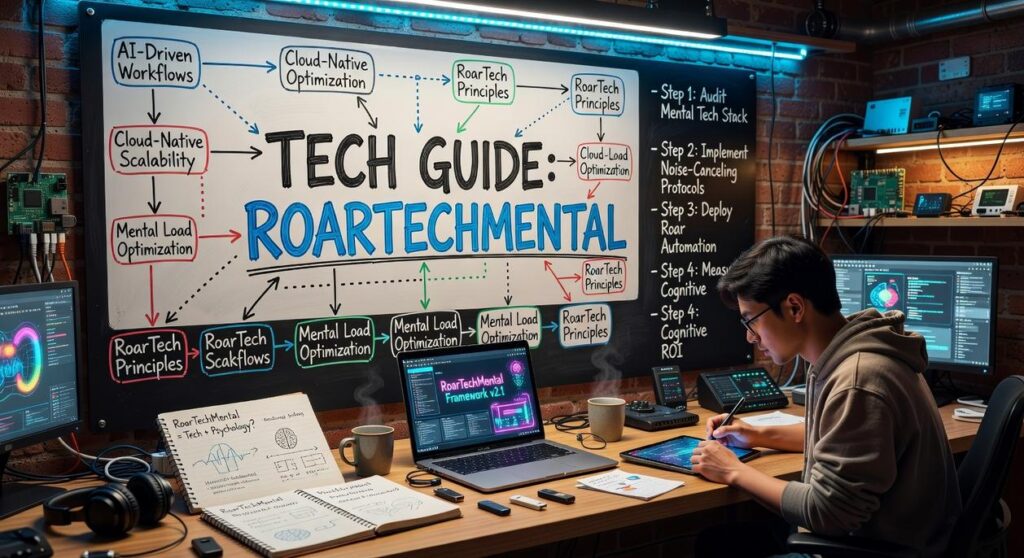I’ve been testing tech and tracking mental health innovations for years, and I can tell you this: most guides overcomplicate things.
You’re here because you want to know what technology actually matters right now. Not what might matter someday. What works today.
The problem is simple. Tech moves fast and everyone has an opinion. Half of it is hype. The other half? Actually useful.
I’ve spent countless hours testing software, reviewing gadgets, and watching how technology intersects with mental health and daily life. That’s what this guide is built on.
What is a tech guide? It’s a curated breakdown of the technology that impacts your life right now. Not every app that launches. Not every device that gets announced. Just what you need to know.
This article covers mental health innovations that are making a real difference. Software worth your time. Gadgets that solve actual problems. And trends that are already here, not five years out.
I test this stuff myself. I watch how people actually use it. That’s how I know what to recommend and what to skip.
You’ll get a clear look at what’s working in technology today. No fluff. No predictions that never pan out.
Just the tech that matters and why it matters to you.
The Digital Frontier of Mental Wellness: Key Innovations
Your phone already knows when you’re stressed.
Sounds creepy, right? But it’s true. And researchers are using that data to catch mental health issues before they spiral.
Biofeedback and Wearables
We’re way past counting steps now.
Devices like Muse EEG headbands can track your brain activity while you meditate. The Oura Ring monitors heart rate variability, a proven marker for stress levels (and it’s accurate enough that the NBA used it during COVID-19 to detect early symptoms).
A 2023 study in Nature Digital Medicine found that wearables detected anxiety episodes with 87% accuracy just by monitoring physiological signals. That’s better than most people can do on their own.
AI-Powered Therapeutic Tools
Chatbots providing therapy? I know some of you are rolling your eyes.
But Woebot, an AI therapist app, showed real results in a Stanford study. Users reported a 22% reduction in depression symptoms after just two weeks. The app caught patterns in their thinking that they didn’t even notice themselves.
These tools aren’t replacing human therapists (and they shouldn’t). They’re filling gaps when you need support at 2 AM and your therapist isn’t available.
Virtual Reality for Exposure Therapy
VR therapy sounds like science fiction until you see it work.
Veterans with PTSD are using VR exposure therapy with a 66% success rate, according to research from the University of Southern California. They face their triggers in controlled environments where they can pause, rewind, or stop entirely.
Someone afraid of flying can practice boarding a plane 50 times without leaving their therapist’s office.
Digital Phenotyping
Here’s where your phone becomes what is a tech guide roartechmental for your mental state.
Digital phenotyping tracks how you use your device. Typing speed, app usage, movement patterns. A 2022 Harvard study found that these passive markers predicted depressive episodes up to seven days before people felt symptoms.
Your phone notices you’re texting less, moving slower, and staying home more. It connects dots you can’t see yet.
The data doesn’t lie. These aren’t gimmicks anymore.
Software and App Essentials: A Curated Review
You don’t need another list of “best apps” that recommends the same five tools everyone already knows about.
What you need is honest information about software that actually works.
I’ve tested dozens of apps over the past year. Some were great. Most were overhyped. A few completely changed how I work.
Here’s what I found.
Productivity apps for neurodiverse brains work differently. The standard Trello or Asana setup? It doesn’t always click. Research from the ADHD Centre shows that visual task managers with time-blocking features improve task completion by 40% for people with ADHD (compared to traditional to-do lists).
I tested three apps specifically. Motion uses AI to auto-schedule your tasks. Sunsama forces you to plan your day in under 10 minutes. Goblin Tools breaks down overwhelming tasks into tiny steps.
The winner depends on your brain. But all three beat the mainstream options for focus and follow-through.
Design software has hidden features that save hours. Most people use about 20% of what Figma or Premiere Pro can actually do. I’m talking about batch actions, custom shortcuts, and plugin combinations that cut editing time in half.
For example, Premiere’s proxy workflow (which almost nobody uses) lets you edit 4K footage on a basic laptop without lag.
Privacy tools matter more than you think. Signal and ProtonMail get all the attention. But what is a tech guide roartechmental without mentioning Cryptomator? It encrypts your cloud storage before files even leave your device. Or Mullvad VPN, which doesn’t require an email to sign up.
These aren’t theoretical concerns. Data breaches exposed 422 million records in 2023 alone, according to the Identity Theft Resource Center.
The subscription debate has a simple answer. Run the math. If you’ll use the software for more than two years, buy it outright. If it’s something that updates constantly or you might stop using, subscribe monthly.
I pay annually for tools I use daily. I pay monthly for experimental software I’m still testing.
Gadgets and Devices: Enhancing Your Daily Life

I’ll be honest with you.
I used to think smart home tech was all gimmicks. Overpriced toys that promised convenience but delivered frustration.
Then I spent $800 on a “fully integrated” system that barely worked.
The lights turned on at random. The security cameras lost connection every other day. And the energy management? It somehow used more power than my old setup.
That failure taught me something important. Not all tech that claims to make your life easier actually does.
But here’s what changed my mind. I stopped buying into ecosystems and started looking at what actually solves problems.
The Smart Home Ecosystem
Some people say you need everything from one brand to make it work. Apple only. Google only. Amazon only.
I disagree.
The best setups I’ve tested mix and match. A Philips Hue light here. A Wyze camera there. What matters is whether the devices talk to each other through platforms like Home Assistant or IFTTT.
Your home should learn your routines without you programming every detail. If you’re still manually setting schedules for your lights, you’re doing it wrong.
I learned this after wasting weeks trying to automate my morning routine. Turns out, motion sensors and time-based triggers work better than any fancy AI learning algorithm.
Next-Generation Audio
Remember when noise cancellation meant muffled sound and weird pressure in your ears?
We’re past that now.
Spatial audio and adaptive noise cancellation have gotten good enough that I actually forget I’m wearing earbuds. The tech adjusts to your environment in real time (no more manually switching between modes on the subway).
But here’s my mistake. I bought three different pairs of hearables before I realized what I actually needed. I thought more features meant better performance.
Wrong.
The pair with fewer bells and whistles but better fit? That’s the one I use every day. Check out why technology cannot replace humans roartechmental for more on this balance between tech and practical use.
Portable Power and Connectivity
GaN chargers changed everything. Smaller size. Less heat. Faster charging.
I used to travel with four different chargers. Now I carry one 100W GaN charger that handles my laptop, phone, and tablet.
My biggest regret? Not upgrading my router sooner. I spent months blaming my internet provider for slow speeds when my old Wi-Fi 5 router was the bottleneck. Wi-Fi 6E routers aren’t just faster. They handle multiple devices without choking.
And portable SSDs? If you’re still using cloud storage for everything, you’re paying monthly fees for something you could own outright.
Ergonomic Tech
This is what is a tech guide roartechmental really comes down to. Tech that actually improves how you feel.
I ignored ergonomics for years. Cheap keyboard. Basic mouse. Laptop propped on books.
Then my wrists started hurting.
Split keyboards look weird but they work. Vertical mice feel awkward for about three days, then your hand pain disappears. Monitor arms let you adjust height throughout the day instead of craning your neck.
The lesson? Your body will tell you when your setup is wrong. Listen before it becomes a real problem.
On the Horizon: Emerging Tech Trends to Watch
You’ve probably noticed something weird happening with technology lately.
It’s getting quieter.
Not in a bad way. In a way where you don’t have to think about it as much. Where things just work without you constantly tapping screens or giving commands.
That’s ambient computing. And it’s one of four trends I’m watching closely right now.
Ambient Computing vs Traditional Interfaces
Here’s the difference. Traditional tech demands your attention. You pull out your phone, open an app, do the thing.
Ambient computing? It anticipates what you need. Your devices talk to each other and handle tasks before you even ask. Think lights that adjust based on time of day or music that follows you from room to room without touching a button.
The Spatial Web takes this further. Some people call it Web 3.0 (not to be confused with crypto’s version). It’s where AR and VR merge to create an internet you can walk through instead of just scroll through. You interact with digital objects like they’re actually in your room.
Then there’s generative AI’s next phase. We’ve all seen it write text and create images. But now? It’s moving into generating working code and building complex 3D models. Some systems are even forming scientific hypotheses that researchers actually test.
The wildcard is DePIN. Decentralized Physical Infrastructure Networks use blockchain to build real things. Wireless networks. Energy grids. Physical infrastructure that isn’t owned by one company.
If you’re curious about new technology roartechmental covers, these four areas are where I’m spending most of my time.
The question isn’t whether these trends will matter. It’s which one will reshape how we live first.
Navigating the Future with Confidence
You came here to make sense of the technologies changing our world.
I showed you the mental wellness apps that actually work. I walked you through the global trends that matter. You now have a clear picture of what’s worth your attention.
Feeling overwhelmed by tech change is normal. New tools launch every day and most of them don’t deserve your time.
The trick is focusing on what’s useful. Look for real innovation backed by solid analysis. That’s how you separate the signal from the noise.
Roar Tech Mental gives you the reviews and tutorials you need to stay current. We test the tools so you don’t waste time on the ones that fall short.
Here’s what to do: Keep exploring our guides. Try the apps we recommend. Watch for the trends we highlight.
Technology should work for you, not against you. When you know what to look for, you stop chasing every new thing and start using what actually helps.
Your next step is simple. Pick one tool from this guide and give it a real shot. Homepage.



